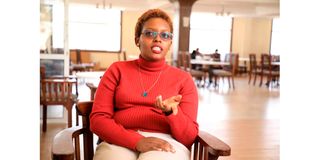Inflation: We moved to the outskirts of Nairobi

Maureen Faustina during the interview at her office in Upper hill, Nairobi on May 6, 2022 .
What you need to know:
- Maureen Faustina and her husband had to move houses to cut costs on rent.
- She moved her children to different schools where they provide for a book fund.
- Ms Faustina is contemplating taking her youngest child who is two years old to school early to cut on live-in nanny cost.
Maureen Faustina, 29, Operations Officer
“I used to live at Fedha Estate in Nairobi’s metropolitan area. I now live in a sleepy little town along Kangundo Road, about 40 kilometres from the capital city. I have to wake up very early to get to work on time.
My husband and I drive our family car from our homestead to a nearest petrol station, where we park it for the day.
From there, we board a ‘Matatu’ to work to cut back on fuel costs. Previously, we would drive all the way to work but the fuel prices are too prohibitive. Sh1,000 worth of fuel could last an entire week but recently, that amount barely lasts a day.
A lot of things have changed since the big move. I am caught between a rock and a hard place. In this economic climate, something had to give.
We had to move houses to cut costs on rent. I no longer spend my evenings cooking and doing homework with my three children. The time I spend commuting is so long that by the time I get home, my children are already asleep.
Since the introduction of four-term-academic year, we have had to live frugally to raise school fees.
The other day, my husband asked me why we were not having meat for supper. Well, I have had to make major changes to our diet because of the skyrocketing food prices. I buy more vegetables and plant-based proteins than meat and milk products.

Ms Faustina hopes her children do not feel the pinch of these dire times.
I would love to buy some meat but I cannot buy a kilo for Sh520 when the same used to retail for Sh300.This is part of the reason we moved to the outskirts of Nairobi.
There is a sense of community where I live. It is easy to barter commodities with my neighbours in case I run out of something. I started growing maize in my backyard that I exchange for vegetables. I also get cow milk from my neighbours since it is cheaper than pasteurised milk from the supermarket.
I hope my children do not feel the pinch of these dire times. We moved them to different schools where they provide for a book fund. My two eldest children can get books from their schools and I don’t have to constantly buy them at the beginning of every academic year.
I no longer buy their school shoes from Bata because of the hefty prices. School shoes used to retail at Sh1,500 but today the same pair goes for Sh4,000.There are more affordable local shoemakers in Limuru town where I have started purchasing shoes from.
I am contemplating taking my youngest child who is two years old to school early. Even though the requisite age for starting is four years, it would be cheaper for him to be in school than keeping our live-in nanny.
Sometimes I forget about my personal needs. I don’t remember the last time I went to a spa. I am not complaining, but I miss having time and money for myself. Part of the reason why I cut my dreadlocks was to reduce the amount of money I spend on hair maintenance.
I have to do everything within my capability to ensure that my family is well taken care of.
I do not regret the sacrifices I have been making because I know I am not in this alone. I talk to my colleagues, relatives and friends and the situation is the same across the board.
In the meantime, I am taking one day at a time.”
Editor’s note: Nation.Africa and The Fuller Project produced this dispatch as part of our “Inflation” project, a collection of firsthand accounts on how the cost-of-living crisis is affecting the daily lives of women around the world.




